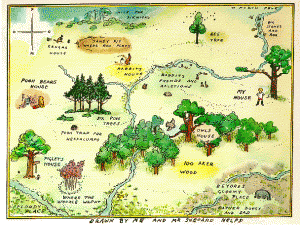Welcome to the Wakefield Doctrine (the theory of clarks, scotts and rogers)
You know, this Wakefield Doctrine really can be fun, provided you’re the kind of person who has: an active imagination, self-confidence (mostly relating to matters intellectual) and find playing with curious and different ideas and satisfying.
However, (the Wakefield Doctrine), when it come to the useful part, (i.e. ‘the Wakefield Doctrine is a unique, useful and fun way to better understand the people in our lives‘) can be a difficult taskmaster. If you, (and by you, I’m pretty much talking to predominant clarks, and/or scotts and rogers with amped-up secondary clarklike aspects*), have the outlook on life that insists that self-improvement is the best investment of your lifetime, (assume that I mean a wide variety of the manifestations of this all too under-accentuated aspect of human nature… i.e. the need for betterment, in all the ‘-lly’s’ (physically, spiritually, mentally) you might come up with. Of course, I recognize that, if you have been to this blog more than twice, I’m, ‘preaching to the elect’.
The cool thing about our little personality theory is that, when you start to see the world (and the people) around you in terms of clarks, scotts and rogers, well it’s pretty much a case of, ‘in for a penny, in for a pound’. Because, once you get to this point, the perspective pretty much starts working on it’s own. You’ll see people acting a certain way that causes you to think, ‘what a roger!‘ or, ‘she is such a scott‘ and then you’ll realize that the behavior that triggered this understanding is nowhere to be found in these pages! Congratulations, you’ve reached the next level! You’re understanding ‘how the person is relating themselves to the world around them’! Now you’re ready to concentrate on ‘seeing the world as the other person is experiencing it.’ And this step is what separates the Wakefield Doctrine from most of the other, more normal approaches to self-development. When you set out to ‘see the world as the other person is experiencing it‘, you are leaving behind the limiting conceits, such as, ‘well, maybe it’s their lack of education’ or ‘clearly she is being stubborn, I told exactly what to do to avoid that heartbreak’ or ‘god! that new manager, he really has it in for me’ and being open to the idea that we, all of us, experience the world in one of three characteristic ways:
- as the Outsider (clark) the world is a separate thing/place/people, we are fine except for that one thing, we know that there is something that everyone (except for us) knows about life and, if we’re careful and don’t get in the spotlight, we’re surely able to discover, learn it and then be able to become real people…
- the Predator (scott) woke up this morning to a bursting-with-life, brimming-with-opportunity world where we need to be on the alert, ready for anything, living right now and when things get frustrating we will attack (it) or run away (from it) but we.will.not.stop moving/living/loving/protecting/eating… until it’s necessary to sleep and then there’s tomorrow!!
- Members of the Herd (rogers) are not in a hurry, but often impatient. We know that everything is connected, except those parts/people/activities that seem to be apart and when we are confronted with them (these parts/people/activities) we do our best to understand how they connect to what we know is the Right Way (and the connections are there…pretty much all the time, it’s just a matter of taking the time, making the person investment in appreciating what it has in common with…. well, everything
Time for work.
Thank to Dyanne for a Comment that is sure to end up a Post. (Lets phrase it as a riddle: ‘why is a shy scott like a writing desk?’)
(and) thanks to Kristi for the Winnie the Pooh reference… it’s clearly a ‘raising-small-humans-centric’ cultural reference…. but, damn! there’s a bunch of different examples of the three worldviews there, in 100 Acre Wood! In fact! (see? this is why it’s not all that difficult to write posts ‘on the same subject’ countless times), maybe, among the characters, (of 100 Acre Wood), we might find illustrations and examples of the effect and influence of secondary aspects (on) the predominant worldview!! Tying in with what Dyanne said!! cool!
* btw our condolences, granted, a little bit of the Outsider worldview makes a scott curious and less likely to eat things when aggravated and a touch of the blue monkey** can result in a roger who actually sees and hears strangers speaking… but it’s not overly predominant-worldview enhancing to have a secondary clarklike aspect.
** blue monkey.. there was this famous sociology/psychology*** experiment back in the 50s or 60s where they took one monkey out of a troupe of monkey and painted him blue and (then) returned him to his friends and family… needless to say, things did not go so well. those sociologists (and psychologists) back in the day could be a bunch of right bastards, empathy with experimental subjects-speaking, that is
*** what? well, maybe not that famous







